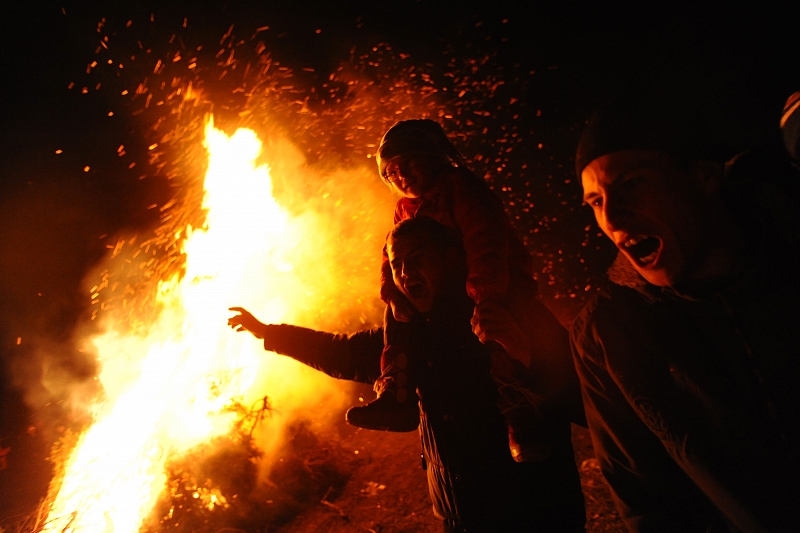Sirni Zagovezni
an ortodox firy ritual strenghtens the family relations
How many of us live a troubleless life? Sooner or later we become victims of betrayals, lies, pure hatred and aggression. Sometimes the people responsible for those feelings come from our enemies,
random people, but unfortunately they also come from our closest and most beloved people. We feel hurt, sad, and we swallow the pain. Or just the opposite, consciously or not, we hurt other people
and then we feel guilty... Is there a way out of this vicious circle? To forgive and ask for forgiveness? In search for this we will look into our forefathers' traditions and experience.
FASTING TIME
It is no coincidence that in the traditional culture of the orthodox Bulgarians there is a special holiday dedicated to forgiveness - Sirni zagovezni, also known as Forgivenesses or Forgiving zagovezdni. That holiday is exactly 7 weeks before Easter and marks the beginning of the great fast. This year Sirni zagovezdni is on 17 March. The Sunday before that, known as No-meat Sunday, people eat meat for the last time. On Nomeat Sunday there are many dishes with dairy products, milk, eggs and fish because on that day people eat them for the last time before before Easter. Some of the traditional meals served on No-meat Sunday are banitsa, Panagyurski eggs, fried fish, etc.
WHITE BLISS
The tradition of "amkane and hamkane" is a big part of Sirni zagovezni. A piece of white bliss (cheese or a hardboiled egg) is put on the one side of a string and the other side of the string is attached to the ceiling. After spinning the cheese or the egg everyone tries to catch it wish their mouth, without using their arms. In recent years the white bliss is replaced by white halva, which is vegan. This shift of tradition first emerged in the cities and later on moved to the smaller villages as well. People enjoy good food, have fun and eat blissful food for the last time. On the next day all dishes and utensils are cleaned with hot water and rubbed down with ashes. Apart from the dairy products, in this period of time people are not allowed to consume alcohol, sing songs, dance, get married or be
intimate with the husbands/wives. Overall, the fast is a time for abstinence and submission when a person has to purify his self from negative thoughts and deed both physically and spiritually.
This is where forgiveness comes in.
The day of Sirni zagovezni passes in visits of relatives and friends, gifts and mutual forgiveness. There are special words to ask and be given forgivness.
Learn the set of phrases used in the old Bulgarian ritual only in issue 2/2013 of Magazine Ossem!
FASTING TIME
It is no coincidence that in the traditional culture of the orthodox Bulgarians there is a special holiday dedicated to forgiveness - Sirni zagovezni, also known as Forgivenesses or Forgiving zagovezdni. That holiday is exactly 7 weeks before Easter and marks the beginning of the great fast. This year Sirni zagovezdni is on 17 March. The Sunday before that, known as No-meat Sunday, people eat meat for the last time. On Nomeat Sunday there are many dishes with dairy products, milk, eggs and fish because on that day people eat them for the last time before before Easter. Some of the traditional meals served on No-meat Sunday are banitsa, Panagyurski eggs, fried fish, etc.
WHITE BLISS
The tradition of "amkane and hamkane" is a big part of Sirni zagovezni. A piece of white bliss (cheese or a hardboiled egg) is put on the one side of a string and the other side of the string is attached to the ceiling. After spinning the cheese or the egg everyone tries to catch it wish their mouth, without using their arms. In recent years the white bliss is replaced by white halva, which is vegan. This shift of tradition first emerged in the cities and later on moved to the smaller villages as well. People enjoy good food, have fun and eat blissful food for the last time. On the next day all dishes and utensils are cleaned with hot water and rubbed down with ashes. Apart from the dairy products, in this period of time people are not allowed to consume alcohol, sing songs, dance, get married or be
intimate with the husbands/wives. Overall, the fast is a time for abstinence and submission when a person has to purify his self from negative thoughts and deed both physically and spiritually.
This is where forgiveness comes in.
The day of Sirni zagovezni passes in visits of relatives and friends, gifts and mutual forgiveness. There are special words to ask and be given forgivness.
Learn the set of phrases used in the old Bulgarian ritual only in issue 2/2013 of Magazine Ossem!



